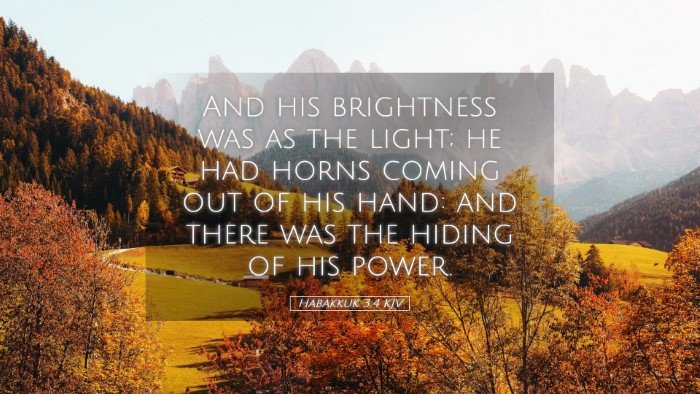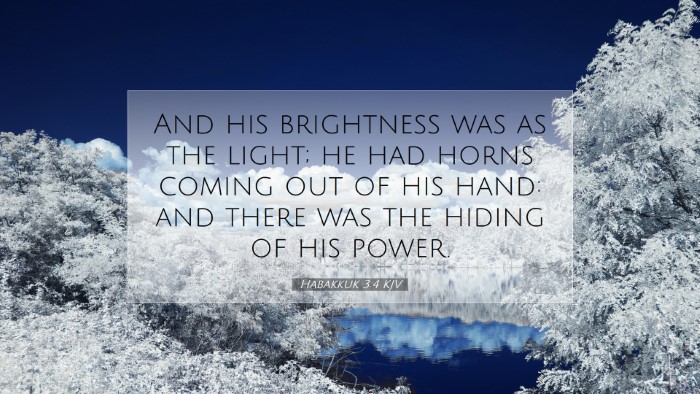Old Testament
Genesis Exodus Leviticus Numbers Deuteronomy Joshua Judges Ruth 1 Samuel 2 Samuel 1 Kings 2 Kings 1 Chronicles 2 Chronicles Ezra Nehemiah Esther Job Psalms Proverbs Ecclesiastes Song of Solomon Isaiah Jeremiah Lamentations Ezekiel Daniel Hosea Joel Amos Obadiah Jonah Micah Nahum Habakkuk Zephaniah Haggai Zechariah MalachiHabakkuk 3:4
Habakkuk 3:4 KJV
And his brightness was as the light; he had horns coming out of his hand: and there was the hiding of his power.
Habakkuk 3:4 Bible Commentary
Commentary on Habakkuk 3:4
Habakkuk 3:4 states: "And his brightness was as the light; he had horns coming out of his hand: and there was the hiding of his power." This verse presents a profound vision of the divine presence and power of God, encapsulating themes of glory and might that resonate deeply with the theology of both restoration and judgment.
1. The Theological Significance of 'Brightness'
Matthew Henry notes that the 'brightness' of God symbolizes His purity, holiness, and the overwhelming nature of His presence. The prophet recognizes that God's radiance reveals His character—unapproachable light, in whom is no darkness at all (1 John 1:5). This connection between divine brightness and the moral perfection of God underscores an important principle that God is inherently good and just.
Albert Barnes emphasizes that this brightness reflects God’s glory as it is manifest in His actions within history. When the Lord intervenes on behalf of His people, His glory shines forth, revealing not just His nature but also His intentions. The brilliance of God serves as both a divine revelation and a source of hope for believers facing oppression.
2. Understanding 'Horns' and Their Symbolism
The imagery of 'horns' derived from God's hands carries significant connotations. Adam Clarke elaborates on how horns symbolize strength and power, often associated with kings and their authority. In biblical literature, the horn frequently represents the might of God's redemptive work, implying that from God’s very being comes salvation and authority.
This phrase may also signify the power that emanates from God, denoting His ability not only to save but also to judge. The horns 'coming out of His hand' could signify the sovereignty of God's will: everything that happens is under His control, from creation to redemption.
3. The Doctrine of Divine Power
The last part of the verse refers to 'the hiding of his power.' This concept has been the subject of rich theological discussion. Matthew Henry suggests that God’s power is sometimes concealed from human understanding or recognition, which may lead to distress or doubt among believers. God’s hidden workings do not negate His sovereignty; rather, they invite faith that transcends visible circumstances.
Albert Barnes shares a similar sentiment, asserting that while God’s power is often hidden, it becomes evident through historical acts of deliverance and judgment. The prophet encourages the faithful to recognize that though God's might may not always be apparent, it is real and active. This doctrine calls upon believers to trust in God’s ultimate plan, affirming that His ways are beyond human comprehension.
4. Application for Believers
For pastors and theologians, Habakkuk 3:4 provides a rich text for preaching and teaching about God’s nature. It invites the community of faith to contemplate the totality of God—His glory, authority, and power. Adam Clarke posits that understanding these attributes leads to a greater reverence for God and recognition of His role in both personal lives and broader societal contexts.
Furthermore, the juxtaposition of glory and hidden power encourages believers to resist the temptation to evaluate God solely based on their immediate experiences. Instead, they are called to trust in His ongoing work, even when it is not evident.
5. The Eschatological Implications
The themes in this passage also bear an eschatological resonance. Matthew Henry points out that the 'hiding of His power' can be viewed through the lens of the final revelation of Christ, where God's glory will be fully unveiled. At the end of days, every eye will see His power and glory in their fullness, aligning with the hope of resurrection and restoration.
In contemporary application, such an understanding compels believers to engage with the world through the lens of hope and anticipation. The power of God that is hidden now will be fully realized in His kingdom, where justice and righteousness reign. This forward-looking perspective brings comfort to believers facing trials, assuring them that God’s ultimate victory is assured.
Conclusion
In summary, Habakkuk 3:4 enriches our understanding of God as a complex divine being whose radiance inspires awe, whose power commands respect, and whose hidden workings provoke faith. Albert Barnes reminds us that these attributes of God serve both as a reassurance and a challenge, calling believers to deeper trust and commitment in a world that often looks chaotic and uncertain. Engaging with this verse offers a fertile ground for both personal reflection and communal discourse among those who study and teach the Scriptures.


